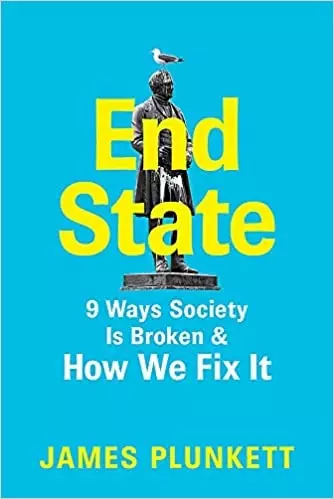End State: 9 Ways Society is Broken
James Plunkett
"End State: 9 Ways Society is Broken", James Plunkett
Welcome big ideas needing more powerful advocacy
Through a fascinating chronicle of social histories and personal anecdotes, James Plunkett critiques our contemporary social economy and sketches alternative big ideas. It’s a curious amalgam, starting with a critique of the high profit ‘FANG’ economy (though notably omitting Public Enemy No 1 Microsoft!), a lengthy discourse on price manipulation by smart algorithm, a deserved critique of the unemployment and poverty traps deriving from welfare benefit withdrawal tapers, an understated critique of the absolutely dreadful PIP system for disabled people which should have no place in any civilised society, and a commentary on the gig economy.
Plunkett’s remedies run through basic income, an increased living wage, adult retraining which he likens to the post-war US GI Bill deployed in very different circumstances, a 4 day week, more holistic healthcare reconceived to be ‘relational, integrated, and empowering’ (p252), child votes, and civil service reform.
This is all welcome creative stuff. The depth and interest of Plunkett’s various discourses at times rambles, and somewhat obscure his crucial points, which deserve a harder-hitting summary. There are some inconsistencies in his argument. For example, a major rationale for basic income is that due to automation, work and wage are unavoidably no longer able to deliver income adequacy, and yet Plunkett still pushes for high wage and retraining solutions. He mutes his own proposal, stating that he has ‘switched from being a UBI sceptic to being a cautious supporter in principle’ (p131).
He restricts his review of basic income to revenue-neutral schemes, which, apart from the gain of eliminating intrusive humiliating means-testing, inevitably deliver no greater impact than some redistribution compared to targeted benefits. He cites the eminent but financially orthodox John Kay that a more radical UBI proposal is ‘arithmetically impossible’ (p127). This ignores the more radical case for UBI, that technology is sucking income out of the economy, forcing unsustainable levels of household and government debt, and generating an urgent twin need to get income to people and debt out of the economy. The only solution to this conundrum is a substantial UBI funded by debt-free sovereign money, which Plunkett doesn’t examine. The Covid economy has demonstrated the feasibility of such a structure by paying a £24,000 annual income to 3 million people, costing £72bn funded as part of the Bank of England’s purchase of £875bn of government debt, which is equivalent to the debt-free issue of sovereign money since the Treasury owns its creditor. This more radical UBI proposal based on a heterodox economic analytic needs unequivocal advocacy.
The book is available here.
Geoff Crocker
Editor ‘The Case for Universal Basic Income'
www.ubi.org

